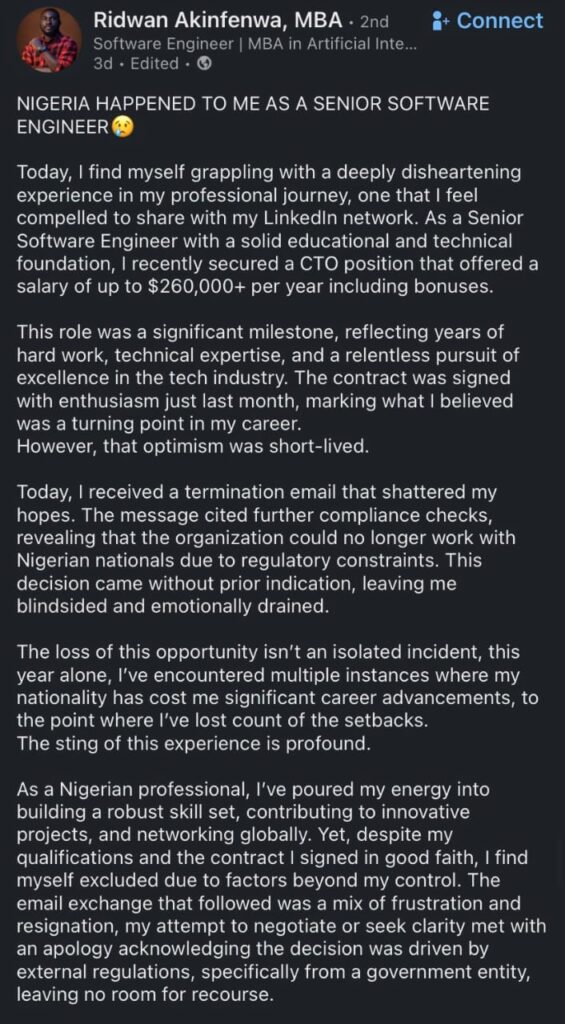Ridwan Akinfewa, a Senior Software Engineer, recently shared his painful experience on LinkedIn. After years of building his career, he secured a Chief Technology Officer role with a package worth more than $260,000 per year. The contract was signed, and the future looked promising.

But within weeks, everything changed. He received a termination email citing regulatory constraints that barred the company from employing Nigerian nationals. Despite his qualifications and a legally signed contract, the decision was final. No negotiation, no recourse—just an apology and a closed door.
For Akinfewa, this was not an isolated event. He noted that in 2025 alone, he has faced multiple career setbacks tied directly to his nationality.
Regulatory Barriers Facing Nigerians
This story highlights a growing challenge for Nigerians and many other African professionals. Increasingly, regulatory frameworks in some countries restrict companies from hiring certain foreign nationals, often citing compliance, sanctions, or risk management.
For global employers, these regulations can be mandatory, but for skilled workers, they translate into lost opportunities regardless of talent or experience. Even industries that celebrate diversity and inclusivity(like technology) remain vulnerable to these invisible barriers.
The Broader Impact on Nigerian Talent
Nigeria produces thousands of highly skilled graduates and professionals every year. Many have contributed to global projects, startups, and tech ecosystems. Yet nationality-based restrictions continue to stall progress in several ways:
- Lost Career Opportunities: Skilled Nigerians often see contracts withdrawn after initial approval.
- Emotional Strain: Repeated exclusion fosters frustration, discouragement, and in some cases, relocation pressure.
- Global Inequality: Excluding talent from entire nations undermines the principle of meritocracy in global recruitment.
- Brain Drain Risk: Talented Nigerians may feel compelled to emigrate permanently to bypass restrictions, weakening local industries.
Navigating the Challenges
Professionals caught in this bind often explore a limited set of options:
- Relocation: Moving to countries where nationality-based barriers are fewer.
- Remote-First Roles: Targeting employers with flexible hiring policies not bound by restrictive regulations.
- Advocacy and Communities: Joining professional groups that campaign for fairer opportunities for international talent.
- Up-Skilling and Global Certifications: Positioning themselves for companies willing to invest in compliance despite restrictions.
A Call for Change
The experience of Ridwan Akinfewa is a reflection of systemic challenges facing many African professionals in global markets. Governments, multinational organisations, and advocacy groups must work together to create fairer frameworks. The focus should shift from where talent comes from to what talent can contribute.
Until then, Nigerian professionals will continue to face an uphill battle to prove that merit should matter more than nationality.









